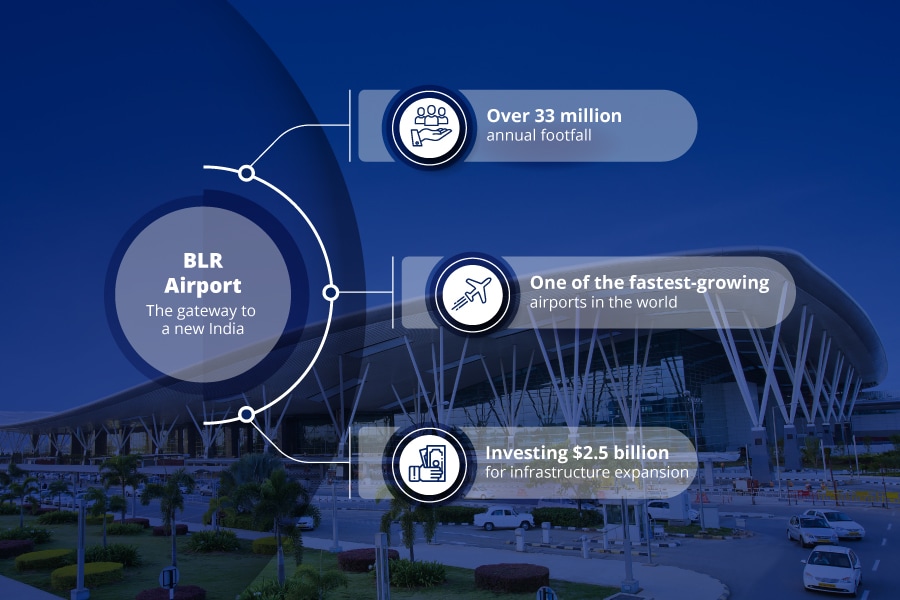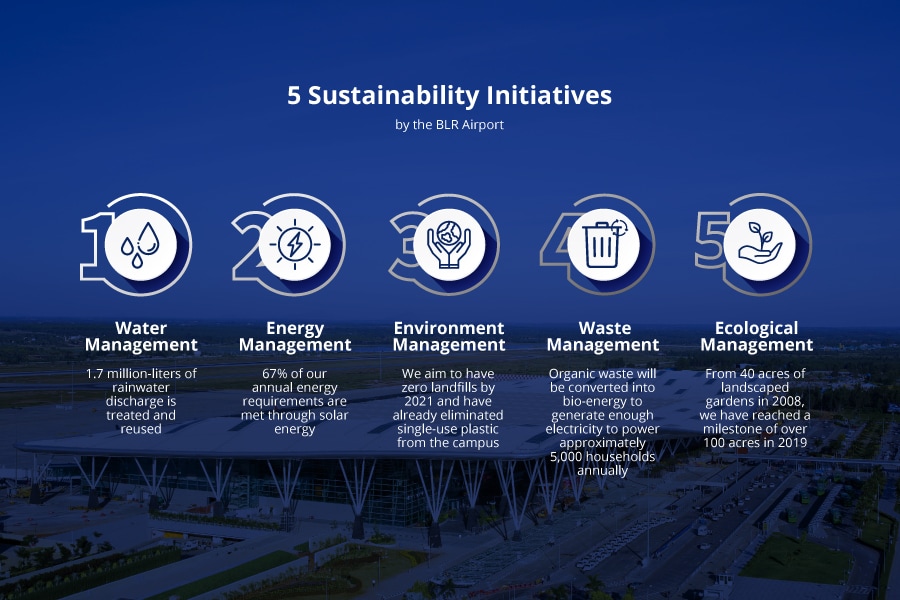


With over 33 million annual footfall, Bangalore International Airport Ltd., Bengaluru (BIAL) is one of the fastest-growing airports in the world. Their goal is to become the gateway to a new India, while constantly implementing innovative methods for ecological sustainability.
To cater to the stupendous growth in passenger volumes projected over the next few years, BLR Airport is investing approximately $2.5 billion (INR 13,000 crore) for infrastructure expansion that includes constructing Terminal 2, a new runway and associated projects, with a firm focus on sustainability in design, construction, and operation.
The airport expansion is centered around four aspects:
1. Technology leadership
2. A terminal built in a garden
3. Environmental and ecological stewardship
4. A celebration of Karnataka’s rich heritage and cultureFrom construction to operations, every aspect of T2 is focused around green principles, lowering carbon footprints and being entirely functional on renewable resources. An innovation par excellence, the gardens at T2 will not only make it a visual delight, but will also provide a natural landscape indoors with native plants, trees, and shrubs which will also further the attempt to reduce dependency on artificial light and mechanical air conditioning. The three R’s of environmental enhancement - Reduce, Reuse and Renew has been implemented across the terminal.The roads and car parking facilities within the Airport premises will be paved with waste plastic. In the first phase, 50-lane kilometers of the roads will be paved by using 50 tonnes of waste plastic- a solution to tackle the plastic menace.To further demonstrate its commitment to sustainable growth, the BLR Airport has already implemented 5 key landmark initiatives:
â— Water Management
â— Energy Management
â— Environment Management
â— Waste Management
â— Ecological Management
 Water Management
Water Management
We’ve partnered with the Indian Institute of Science (IISc) on improving water positivity in an area with a depleted water table. The BLR Airport has invested in rainwater harvesting to meet the requirements of 100,000 passengers who fly daily. Rainwater discharge of about 1.7 million-litres capacity, is treated and reused. Excess water from these tanks is being used as an aquifer for adjacent lakes. Development of rainwater harvesting ponds in the BLR airport will collect over 750 million litres of rainwater/ annum, benefitting the livelihood of several farmers in the vicinity. With 315 recharge pits, approximately 500 million litres of rainwater has been used to recharge the groundwater. Six abandoned wells have been rehabilitated, cleaned and repaired and with a recharge system in place, the wells now hold substantial amounts of water, even during summer months.Energy Management
The BLR Airport aims to be powered completely by renewable energy by 2020 to reduce carbon emissions. Over 50 million units are being powered through on-site and off-site solar Power Purchase Agreements (PPA) that now meet 67% of its annual energy requirements. The street and perimeter lighting are completely powered by LED, providing enhanced safety for pilots, greater visibility for ground staff and reduce energy consumption, thereby helping BLR Airport save 11.5 lakh units of electricity annually.
Environment Management
Our pro-environment strategy of no plastic, pollution control, waste management, sewage plant treatment, and solid waste management, further enables our successful sustainability initiative. The BLR Airport aims to have zero landfills by 2021 and has already eliminated single-use plastic from the campus. Anti-pollution drives for landscaping, afforestation, installation of an oil-water separator on the airside and hazardous waste centre to prevent contamination and campaigns for e-charging stations and emission control mechanisms to achieve community coordinated initiatives have been taken.
Waste Management
To recycle wastewater and reduce dependency on freshwater, the BLR Airport has devised a strategy to design and construct a 2 million litre STP that treats water for re-use in gardens and air conditioning. As part of its Phase 2 development, they are also constructing an additional STP, capable of processing 3 MLD/ day. Due to the huge footfall, over 20 tonnes of waste is generated daily. The BLR Airport is developing its SWM facility, the first phase of which is expected to go live in 2019 with a capacity to process all the 20 tonnes in a day, and the ability to expand to 60-tonne processing. Once commissioned, organic waste will be converted into bio-energy to generate enough electricity to power approximately 5,000 households annually. The facility will also annually generate around 1.5 million kgs of organic compost ensuring zero landfill disposal. BLR Airport is a pioneer among airports in Asia to adopt an in-house, integrated waste management facility.
Ecological Management
The BLR Airport has qualified professionals to manage the ecosystem in its operational areas with an approach to ensure that Planet, Profit, and People are in harmony. Our team of horticulturists and irrigation experts play a vital role in aesthetic improvement through landscaping and green belt development to live up to Bengaluru’s tag of ‘Garden City’ of India. Together, they control soil erosion, improve the aesthetics and micro-climate of the area. From 40 acres of landscaped gardens in 2008, we have reached a milestone of over 100 acres now. Our plans are also devised keeping in mind sustainable practices to safeguard the future of our community.
Follow the BLR Airport online on Instagram"‹"‹| Facebook"‹"‹| Twitter"‹"‹| LinkedIn"‹"‹| YouTube"‹
Disclaimer: The pages slugged ‘Brand Connect’ are equivalent to advertisements and are not written and produced by Forbes India journalists.
First Published: Aug 30, 2019, 04:50
Subscribe Now- Home /
- Brand-connect /
- Sustainability-at-blr-airport